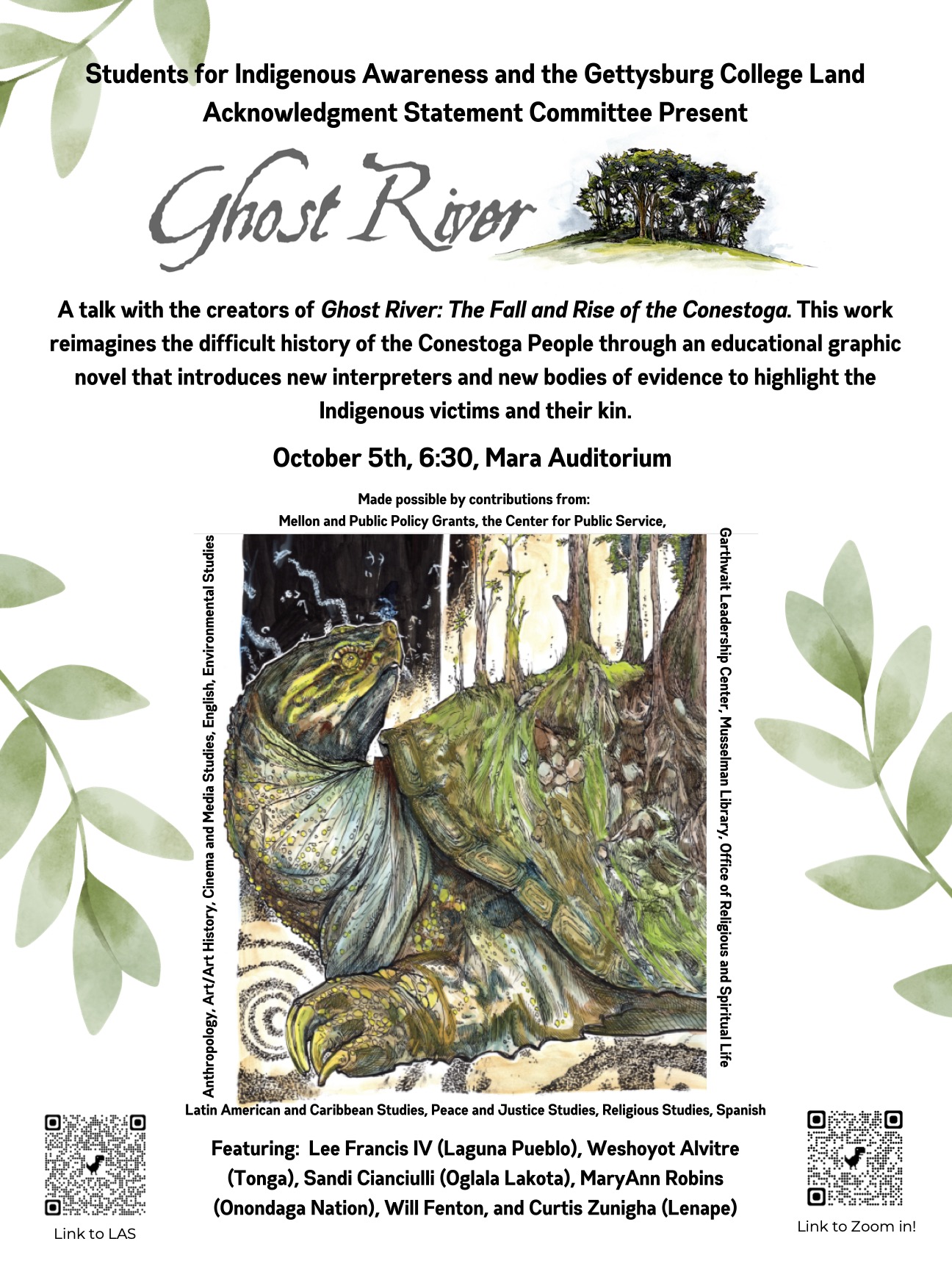Students for Indigenous Awareness Hosts Creators of ‘Ghost River’

The poster for the Ghost River panel (Photo courtesy of Students for Indigenous Awareness and the Land Acknowledgement Statement Committee)
By Katie Oglesby, Magazine Editor
Students for Indigenous Awareness and the Land Acknowledgement Statement Committee hosted a panel with the creators of the graphic novel Ghost River: The Fall and Rise of the Conestoga on Thursday, Oct. 5 in person in Mara Auditorium and virtually on Zoom.
This talk was a part of the annual Peace and Justice Week. The creators of Ghost River, including writer Lee Francis IV, Project Editor Will Fenton, Community Advisor Sandi Cianciulli, and Community Advisor MaryAnn Robins were present at Mara, while artist Weshoyot Alvitre and Curtis Zunigha joined through Zoom.
Chair of Environmental Studies Salma Monani gave the land acknowledgement statement to begin the discussion. Then Zunigha, a member of the Delaware Lenape tribe, gave a land welcoming statement.
Fenton noted that if students or faculty want to purchase the book they should do so from Red Planet Books and Comics, the only Native American-owned comic book shop in America, which is also run by Francis, one of the other speakers. The comic is also available for free online.
The speakers each discussed the tribe they were from and their roles in the comic. Francis spoke about his uncertainty starting the project without being of the Conestoga people, so he ensured that many Native writers and people were involved in the process.
“We’re seeing a lot more of it, of getting Native writers and Native folks involved in the stories before they’re published, not just as consultants to check the box,” he said. “Ultimately, for me in writing this, I have a responsibility to the ancestors … to make sure that this is represented correctly, in a way that honors that history that hasn’t been told, and to honor those voices that were silenced 200 years ago.”
Zunigha commented on what a land acknowledgement statement should do.
“Let us use that acknowledgement to say that it is time to recognize that you can’t change the past, but we are still part of institutions that have built their own legacy on these unceded lands that, quite frankly, were stolen on the graves of people who were killed and murdered by racism,” he said.
“I encourage everyone in this auditorium … to make a commitment to put an action statement onto your land acknowledgement … that says we’re going to learn about what colonialism has done to our society today and how it has marginalized the descendants of those original people, and it is time to use an institution like Gettysburg College as a rallying point to decolonize institutions that still operate on the power of those who took over the land and ran the natives off,” he continued.
The conversation veered back toward the creation of the graphic novel.
Francis said, “It’s not the story of dead and dying Indians; it’s the story of living, alive, powerful, amazing native and Indigenous peoples that are still here.”
Weshoyot discussed her artistic inspiration for the graphic novel. She hand drew every page using a 19th century quill pen and colors made from natural elements.
During the question and answer portion, someone asked how to decolonize thought processes and institutions. In response, Zunigha proposed that colleges include a course on the history of Indian Boarding Schools (residential schools) and ensure they not only hire Native professors to teach these courses, but that they put those professors on the tenure track.
“We need to learn these lessons and look at it as a greater American policy of dealing with their Native people and [bringing] those descendants back to the land … and give them a voice, give them time to heal,” he said. “We can learn from that and make sure we don’t repeat that ever again.”
